#terry breverton
Explore tagged Tumblr posts
Text
Terry Breverton – İcatlar Ansiklopedisi (2024)
Wright Kardeşler’den önce kim uçtu? Plastik cerrahi nasıl icat edildi? Leonardo da Vinci ilk robotu tasarladı mı? İlk e-posta ne zaman gönderildi? Bira ilk nerede üretildi? Sıfırı kim icat etti? Balık kancasından fiber optiğe, piramitlerden posta pullarına ve baruttan GPS’e kadar, bu eklektik derleme, bugün hayatımızı şekillendiren deha anları hakkında daha fazla bilgi edinmek isteyen herkesi…

View On WordPress
#2024#Alfa Yayınları#Alper Hayreter#Teknolojik Sıçramaların Çığır Açan Keşiflerin ve Bilimsel Buluşların Özeti#Terry Breverton#İcatlar Ansiklopedisi
0 notes
Photo

48th Book I Read in 2023
Title: Breverton's Phantasmagoria
Author: Terry Breverton
Notes: Really loved this book! Super interesting.
#Terry Breverton#Phantasmagoria#Breverton's Phantasmagoria#nonfiction#book#books#bookblr#reading#2023#english#engelska
0 notes
Note
There is definitely a question of how much Henry was aware of, and at what age; so this is all of course speculative, but assuming he was informed as the heir of what dangers were present around the throne, the groundwork for the downfall of like, the Duke of Buckingham, for example, was a fairly straight line to its eventuation:
"Upon 25 January 1504, Henry [VII] opened his seventh and last Parliament [...] [in which] fifty-one men were attainted—the largest number in one single action in Henry's reign. [Within] was the revelation of the 'Calais Conspiracy' of 1504, where captains of the garrison discussed the virtues of Edward Stafford, Duke of Buckingham, and Edmund de la Pole, Earl of Suffolk, as worthy successors to Henry VII. Tellingly for the king, Henry, Prince of Wales, was not considered. [...] [The king] had an [informer] in Suffolk's inner circle, [who] informed [him of] a clandestine meeting at Calais: 'Some of [the plotters] spake of my Lord of Buckingham, saying that he was a noble man and would be a royal ruler. Others that were that spake in likewise of yon traitor, Edmund de la Pole, but none of them spake of my Lord Prince [Henry].' Following [this] information, arrests were made [...]"
Do you think Henry VIII's childhood had a significant impact on his psychological development as an adult?
'Psychological' is not really something we can diagnose from remove; but more reasonably, yeah, I think his childhood set up his...what is a broader, less diagnostic term... emotional blueprint (perhaps even setting up his 'relationship' with God, as he would have understood it)? I think the impact of the death of his elder brother (it's generally argued he wouldn't have felt grief for this because they hadn't been raised together, the extent and intimacy of their interactions was more like cousins than what we think of as usual for siblings, but regardless of how well he 'knew' him, of course this was impactful insofar as it shaped his life by making him heir) and mother within the same year is generally underrated.
He was in the public eye at a very young age, his various ennoblements were granted to counter Warbeck's claim, one can presume that his admiration of Henry V might even have began here (Lord Warden of the Cinque Ports had been Henry V's title as Prince of Wales, Henry VIII will later, mainly, keep this specific title in his family in a pattern that denotes the violent flux of Henrician factional politics: Edward Guildford is his father's appointment, but once he dies, the title goes to his brother-in-law, George Boleyn, after Rochford's execution it's granted to his natural son, Henry Fitzroy, there's an interim exception where it goes to Thomas Cheney, but afterwards it goes to Henry's uncle, Arthur Plantagenet, until his arrest...thereafter it's in a joint office with Cheney again, and Henry's brother-in-law, Thomas Seymour, presumably as a reward for his military services); but there's this succession of threat, ennoblement, threat, sanctuary, reprisal of execution(s) for the threat(s) (and also executions for dynastic security, such as that of Edward Plantagenet, prior to the arrival of his future sister-in-law/wife), threat (in the vulnerability of the succession, once Arthur dies), followed with the death of his mother...
So all this was inevitably going to shape him to believe that there was nothing more important in the world than the Tudor succession, and specifically in his own children (in his more idealistic, optimistic beginning, sons) being the ones to inherit the throne. Why else would God have chosen his father to win Bosworth, why else would God's choice have been Henry instead of Arthur as King, if he doesn't have surviving sons by his first wife, it must have been because his choice in her as the mother of his heirs was contrary to God's will, if he doesn't have surviving sons by his second wife, it must have been because of the same reason (and by Anne, it's possibly compacted by CTE, but I think there was also an element of...by this marriage, it's about his seventh child, that has been miscarried or been stillborn, the severity of her downfall and the observation of 'you never saw prince nor man who made greater show of his horns or bore them more pleasantly' can be attributed to the comfort he might have felt in the extent of the 'depravity' suggesting that her miscarriages had been the children of other men, not his own...tied in with his allegation that Anne had been trying to poison Fitzroy and Mary, again there's ties into the protection of his succession being the general thrust behind these actions, and if it has to be protected by means of violence, well, that was in the marrow from the start...)
10 notes
·
View notes
Text
James Skyrme a Welsh pirate
One of Bartholomew Robert's captains was the Welshman James Skyrme (c. 1678-1722)

His flag, according to a description by Captain Ogle
Not much is known about him (only what Captain Ogle later reported), except that he sailed from Bristol in the summer of 1720 as first mate of the Greyhound. That October, Bartholomew Roberts captured a dozen ships off St Lucia, including the Greyhound. After her capture, Skyrme signed her articles and joined Roberts' crew while Roberts burned the Greyhound.
Two French ships attacked Roberts in April 1721, but were themselves captured by the pirates. Roberts renamed the ships, handed over command of the Ranger to Thomas Sutton and gave the Little Ranger to the Skyrme, which Roberts used as a storage ship. Sailing alongside Roberts, they captured a number of other ships and their crews. Later that year, Roberts docked at Cape Lopez to cruise, replacing Sutton with Skyrme as captain of the Ranger.
In February 1722, Captain Chaloner Ogle of HMS Swallow baited Roberts with an attack on his 50-gun warship. Mistaking it for a fleeing merchant ship, Roberts sent Skyrme with the Ranger to capture it. When the Ranger was alone, Ogle set the trap and opened fire on the pirates. After a brief skirmish, Ranger was badly damaged, several pirates had been killed, and Skyrme's leg had been severed by cannon fire. Skyrme tried to continue the fight, but the Ranger finally struck the flag and surrendered. Desperate pirates tried to blow up the Rangers by firing a pistol into a barrel of gunpowder, but they failed and were badly burned. Five days after the victory over Skyrme, Ogle returned to Cape Lopez and destroyed the rest of Roberts' fleet; Roberts died early in the battle. Swallow took the survivors and the badly wounded Skyrme to Cape Coast Castle, where they were tried and most of them, including Skyrme, were hanged in March.
Ranger herself survived the battle against Ogle's Swallow, though not much longer. She was sent back across the Atlantic as a prize ship and sank off Port Royal when a hurricane devastated the town in August 1722.
The Pirate Encyclopedia: The Pirate's Way, by Arne Zuidhoek
Pirates: The Truth Behind the Robbers of the High Seas, by Nigel Cawthorne
Black Bart Roberts: The Greatest Pirate of Them All, by Terry Breverton
Daily Life of Pirates, by Marley David
54 notes
·
View notes
Text
"Paul Hentzner, a German visitor to England in 1598, described dinner for Queen Elizabeth at Greenwich Palace during his stay:
'But while she was still at prayers, we saw her table set out with the following solemnity: A gentleman entered the room bearing a rod, and along with him another who had a table-cloth, which, after they had both kneeled three times with the utmost veneration, he spread upon the table, and after kneeling again, they both retired. Then came two others, one with the rod again, the other with a salt-seller, a plate and bread; when they had kneeled, as the others had done, and placed what was brought upon the table, they too retired with the same ceremonies performed by the first. At last came an unmarried lady (we were told she was a countess) and along with her a married one, bearing a tasting-knife; the former was dressed in white silk, who, when she had prostrated herself three times in the most graceful manner, approached the table, and rubbed the plates with bread and salt, with as much awe, as if the queen had been present.'
When they had waited there a little while, the yeomen of the guards entered, bareheaded, clothed in scarlet, with a golden rose upon their backs, bringing in at each turn a course of twenty-four dishes, served in plate, most of it gilt; these dishes were received by a gentleman in the same order they were brought, and placed upon the table, while the lady-tester gave to each of the guard a mouthful to eat, of the particular dish he had brought for fear of any poison. During the time that this guard, which consists of the tallest and stoutest men that can be found in all England, being carefully selected for this service, were bringing dinner, twelve trumpets and two kettle-drums made the hall ring for half an hour together. At the end of all this ceremonial a number of unmarried ladies appeared, who, with particular solemnity, lifted the meat off the table, and conveyed it into the queen's inner and more private chamber, where, after she had chosen for herself, the rest goes to the ladies of the court. The queen dines and sups alone with very few attendants; and it is very seldom that any body, foreigner or native, is admitted at the time, and then only at the intercession of somebody in power.'"
From The Tudor Kitchen: What the Tudors Ate & Drank by Terry Breverton
9 notes
·
View notes
Quote
On 24 March [1509], the king collapsed. Within a week, the Venetian ambassador to London recorded that [Henry VII] was 'utterly without hope of recovery'. On 31 March, Henry made a thirty-seven-page will (totalling 13,000 words), parts of which had been drawn up before. In it, he insisted that any subject who had been unfairly punished by illegal taxation, or fined unjustly by the government, should be repaid and he left enough money for 10,000 masses to be said for his soul in Purgatory. The king cancelled all existing fines owed to the Treasury lower than the sum of £15, and pardoned all minor criminals.
Terry Breverton, Henry VII: The Maligned Tudor King
#henry vii#on ash wednesday had said that#'if it pleased god to send him a new life'#'they would find him a new changed man'#also#i know i quote this biography a lot but#h7's been truly needlessly maligned#(*cough* ricardians *cough*)#terry breverton#henry vii: the maligned tudor king
85 notes
·
View notes
Note
possible origin from my "nautical terms" book: from the latin galea, an oar-powered fighting ship is called a galley. ship cooks and helpers were referred to as galley slaves, so it's likely that the kitchen got the name from them
the book also lists the origin as uncertain. it's Breverton's Nautical Curiosities: A Book Of The Sea by terry breverton
Hi, I just discovered your blog, and I LOVE it! Even though I am shit at actually learning languages, linguistics have always been an interest of mine, especially in connection with history, one of my special interests.
Could you maybe explain the etymology of galley, like in a ship's kitchen-space? Is it connected to the name of the ship type or are they false cognates?
i... cannot find an etymology for the kitchen sense of galley??? someone please help. maritime linguists if you exist i need you
111 notes
·
View notes
Text
A dead man's chest
A dead man’s chest
Bartholomew Roberts, known as Barti Ddu or Black Bart Welsh Pirates and Privateers by Terry Breverton. Gwasg Carreg Gwalch 2018. Fifteen men on the dead man’s chest, Yo-ho-ho and a bottle of rum… Who does not thrill to very mention of pirates? I do, for sure, and for all the usual reasons — the smell of open sea, the ship in full sail, the thrill of the chase, the bustle of action as other ships…

View On WordPress
2 notes
·
View notes
Photo

Keelhaul from the book “Breverton's Nautical Curiosities” by Terry Breverton.
https://www.amazon.co.uk/Brevertons-Nautical-Curiosities-Book-Sea/dp/1847247768
#terry breverton#breverton’s nautical curiosities#keelhaul#keelrake#naval history#royal navy#age of sail
35 notes
·
View notes
Photo



Now I’ve heard some mixed stuff on Terry Breverton (mostly problems with bias and editing) I’ve never read him so I can’t really add an opinion on that, however I do think, Breverton, being a Welsh author is interesting as it gives us a different perspective on these three men and where they grew up, Wales played a huge part in these men’s lives and it shouldn’t be forgotten where they are from, and the truth is where are lacking books on both Owen and Jasper.
12 notes
·
View notes
Text
Thanks for the tag @seynne!
3 Ships I (currently) like: - Lawrence/Benítez (Conclave 2024) - Neil Perry/Todd Anderson (Dead Poets Society) - Javert/Valjean (Les Misérables)
First Ship Ever: Javert/Valjean (Les Misérables)
Last Song You Heard: "We Didn't Start the Fire", by Hildegard von Blingin' https://youtu.be/drDs-Y5DNH8?si=fHAWsZe5cHeWJmdo
Favourite Child Book: some children's book about King Arthur, it started my interest for the Arthurian legends.
Currently Reading: The king in the car park, by Terry Breverton. It's about English medieval king Richard III.
Currently Watching: a show on Disney+, "Emergence". There's a plane crash on a beach, but the police find only a little girl. The girl is taken in by one of the police officers, but bad guys want to get to her. Stuff happens.
Currently Consuming: just had a chocolate mug cake.
Currently craving: right now I'm not craving anything.
Fandom Peeps to Get to Know Better
Miouuuuu, thank you for the tag @desfraisespartout ! It's been a while I did not do one of these ♥
3 Ships I (currently) like:
Marcus x his rock gnome friend (because I'm fucked up. That's why. Also writing a fanfiction about a character is the easiest way to fall for them.)
Ulysse x Penelope (WELL! I'M SORRY! But Epic was an epic discovery, and rekindled my love for the Odyssey ♥)
Keyleth x Vax'ildan (I'M JUST AT SEASON ONE AND AM MERELY WATCHING THE ANIMATED SERIE. SHHHHH.)
First Ship Ever:
Sephiroth x Kuja. No, I cannot explain.
Last Song You Heard:
The FIFA24 soundtrack because my husband and son are playing it-_-
Favorite Child Book:
The Odyssey. I'm not kidding. Is one of the first books I read by myself. My mother must have been depressed -_- It also helps that at about 7, I participated in a child theater play about the Odyssey? Perhaps later.
Currently Reading:
I'm re-reading LOTR, reading Dune, and Good Omens + ACOTAR (the later two are for work)
Currently Watching:
Vox Machina, going on season 2!
Currently Consuming:
Baldur's Gate 3.... AH SORRY! It's not what you meant :D I'm preparing a tartiflette for tonight.
Currently Craving:
FUcking chocolate.
I need to tag other people, which may be surprised because I've been very absent here XD
@endeavour12345 @zelyna-w @revoleotion , @gemmababbler @lulu-croissant
3 notes
·
View notes
Text
tag yourself i'm the glozel mystery

#sadly not cool enough to be that rad skull :/#booklr#book photography#mine#this is breverton's phantasmagoria#by terry breverton#in case anyone was curious
10 notes
·
View notes
Text
Regarding the 'weak' and 'laughable' qualities of Henry Tudor's claim, the history of English royal succession had long been a matter of much discussion on the Continent - 'the English kill their kings", as we shall find. There has been much nonsense written about the rights of royal inheritance in recent years from a modern, politically correct perspective. Henry's claim to the throne was as strong as that of anyone else who took it. That was how things worked centuries ago. Indeed, the most 'laughable' claim to the throne belongs to the present Hanover dynasty, whose first king, George I, was actually 58th in line but the first Protestant. Of course, in today's terms, Henry Tudor 'usurped' the throne from Richard III. However, Richard III's elder brother Edward IV had killed Henry VI and himself usurped' the crown. Richard III, in his time, had 'usurped' his nephews Edward V and Prince Richard, by calling them illegitimate and disposing of them. Henry IV had 'usurped' and killed Richard II. Any claim to the throne of England through the Danes and Germanic Saxons, to the Franco-Danish Normans, to the French Angevins and Plantagenets was nearly always disputed. There never was any solid lineal right of succession, and in contrast to the Hanoverian line, Henry VII had the first 'British’ blood of any king of England since the pagan Saxon invasions.
Owen Tudor: Founding Father of the Tudor Dynasty, Terry Breverton
#I've only just started reading this and it just reminded me of when we were all talking about the so called the divine right of kings#and how it doesn't really exist - it was more about who could sit on the throne the longest#and yes this is a book about Owen but this is part of the introduction#History#Henry Tudor#Henry VII#Henry VI#Henry IV#Richard III#Edward IV#Richard II#Medieval History#Wars of the Roses#Quotes#Books#my post
43 notes
·
View notes
Photo
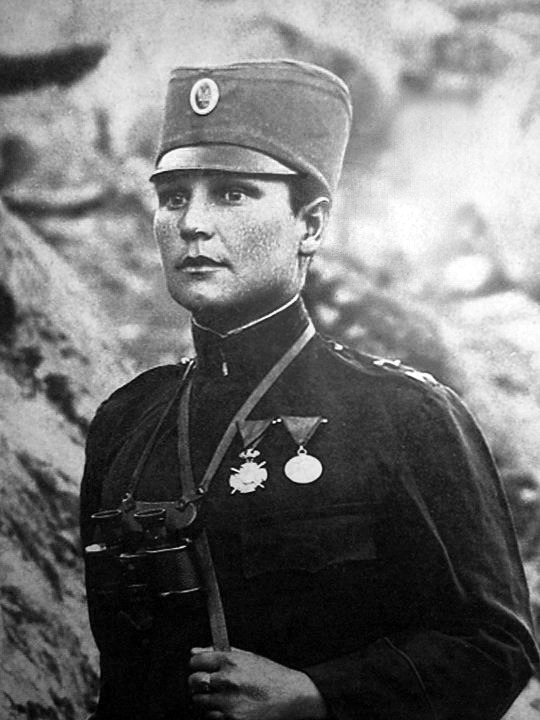
Milunka Savić - World War I’s most decorated woman
Milunka Savić (c.1890-1973) was born in Serbia. She took her brother’s place and enlisted in the army under the name Milun Savić during the Second Balkan War. During the Battle of Bregalnica, Milunka was leading her tenth charge at the head of a squad of men when she was wounded when an enemy grenade blew up at her feet.
Her real identity was discovered and Milunka was brought to her commanding officer who offered her to join the nursing corps. Milunka refused. She told him that she wouldn’t accept a position that didn’t allow her to bear arms to defend her country. Her superior thus promoted her to junior sergeant and allowed her to stay in the infantry.
Milunka was thus openly fighting as a woman when the First World War began. She was part of a prestigious unit nicknamed “The Iron Regiment”. During the Battle of the Kolubara river (3-9 December 1914), she single-handedly assaulted an Austrian trench, hurling grenades, and subsequently captured 20 Austrian soldiers. Milunka excelled at throwing grenades at used them to destroy the enemy machine guns. Her performance was so impressive that she was later nicknamed “The Bomber of Kolubara”. Milunka later told the press that during her childhood in the countryside, she spent a lot of time herding sheep. She and her young comrades played at hitting different targets by throwing stones. This was how she acquired her skills.
She went on to participate in several battles and fought alongside the French soldiers on the Macedonian front. In 1916, she single-handedly captured 23 Bulgarian soldiers. She was hospitalized at least 3 times and earned many awards for her performance in combat. Among the decorations Milunka received were the French Légion d’honneur, the Croix de guerre, the Cross of St. George, the Most Distinguished order of Saint Michael and Saint George and the Serbian Medal for Bravery.
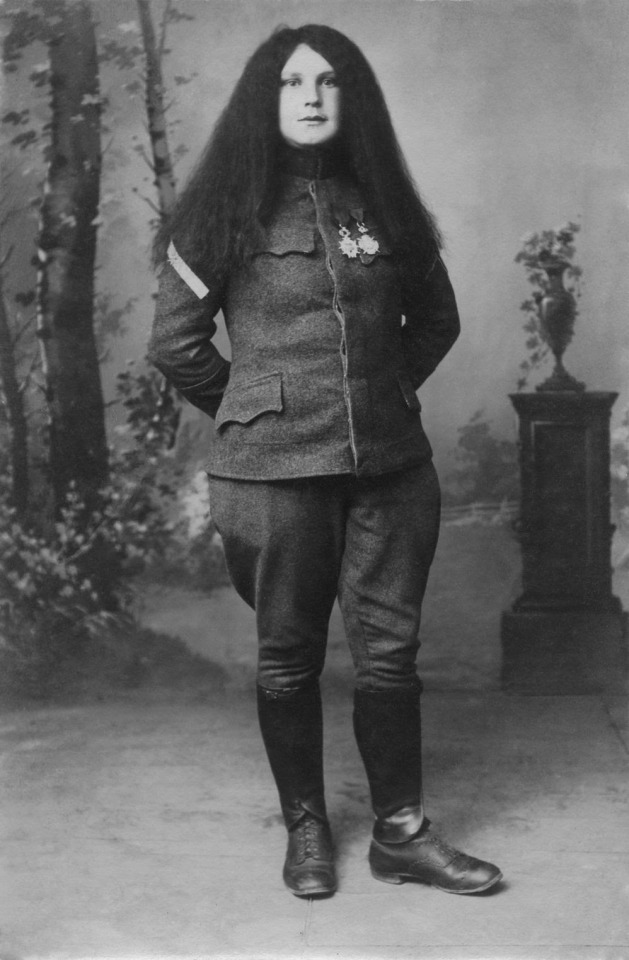
(Milunka in uniform in 1917)
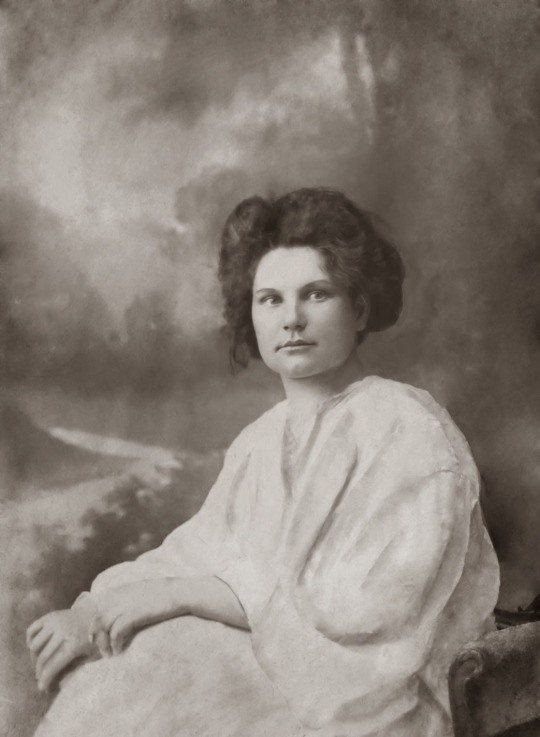
Milunka’s case wasn’t unique. A young woman from Belgrade named Sofija Jovanović served like her in the Second Balkan War and the First World War. Remarkably cultivated, Sofija attracted the attention of the foreign press and earned the nickname of “Serbian Joan of Arc”. She too received a number of Serbian medals for her merits.
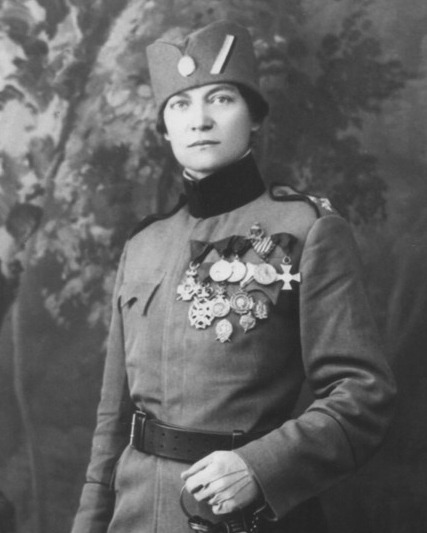
(Sofija Jovanović)
Two school teachers named Jelena Šaulić and Ljubica Cakarevic also fought among the Serbian troops. A Slovenian woman, Antonija Javornik, was also part of the Serbian army, as was the British woman Flora Sandes .
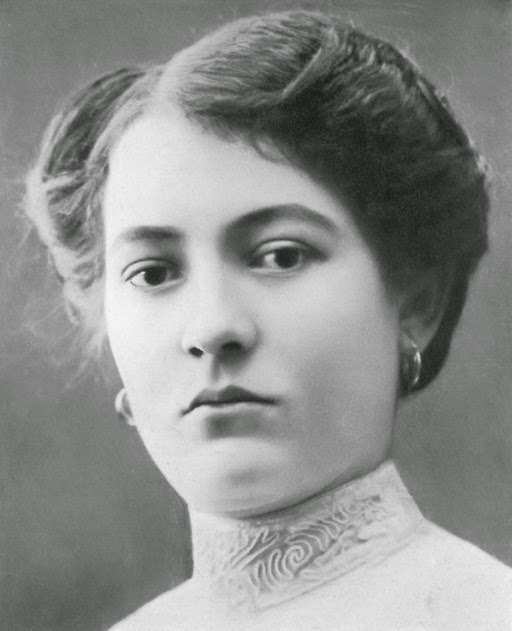
(Jelena Šaulić)

(Antonija Javornik)
Milunka married after the war and gave birth to a daughter, but the union didn’t last long. She afterward adopted three other girls. Since she had never been to school, Milunka had to work as a cleaning lady, but faced the situation with courage and dignity. She managed to send all her daughters to school and helped thirty children, many of them from her natal village, to get a proper education as well.
During the Second World War, Milunka still found a way to help her country. She notably hid antifascists in her home and nursed them, creating a kind of secret hospital. She died in Belgrade in 1973 and was buried with military honors. A street in Belgrade is named after her.
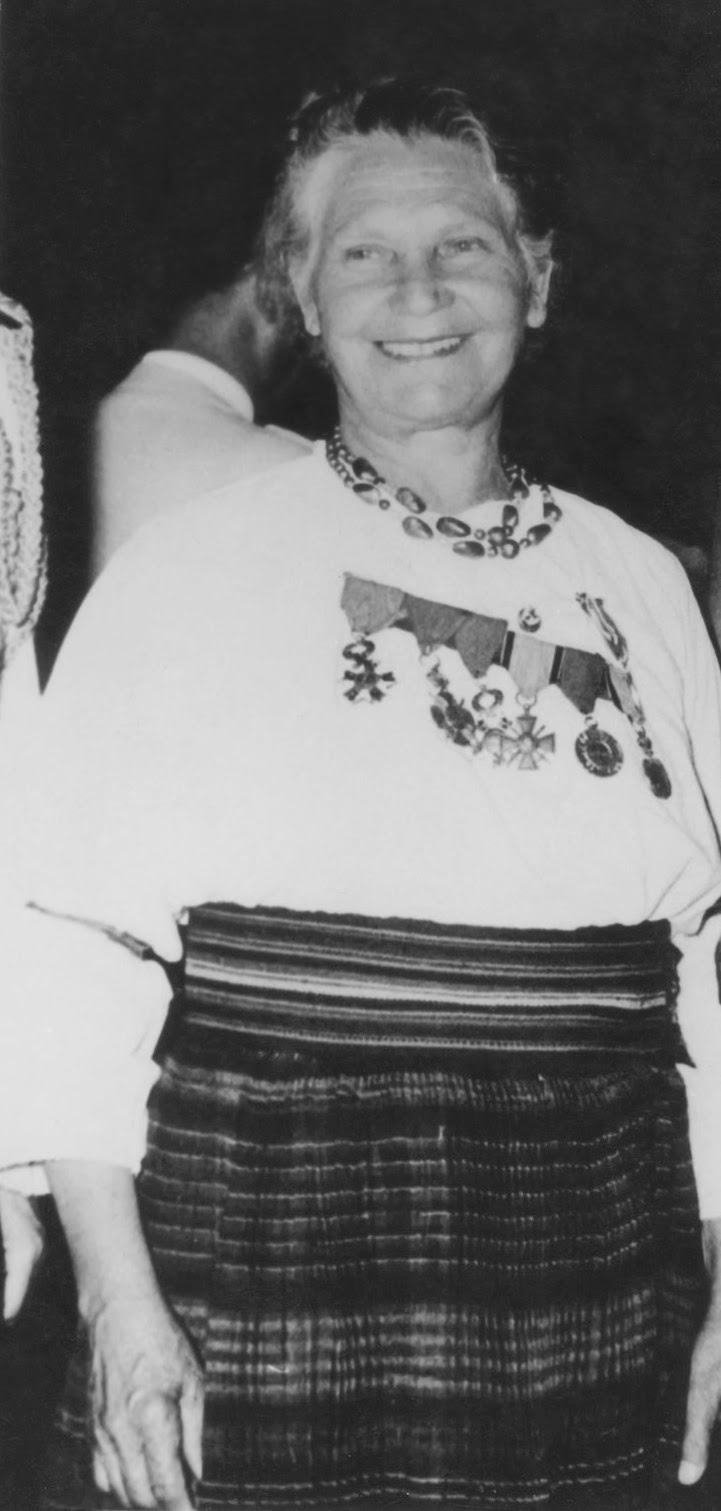
(Milunka in 1966)
References:
Breverton Terry, Breverton's First World War Curiosities
“La Serbie s'invite : entretien avec Slađana Zarić : Milunka Savić et les femmes de l'armée serbe pendant la Grande Guerre”
Larson Carmichael Jacqueline, Heard Amid the Guns, True Stories from the Western Front, 1914-1918
Toler Pamela D., Women warriors: an unexpected history
#Milunka Savić#Sofija Jovanović#Jelena Šaulić#Ljubica Cakarevic#Antonija Javornik#history#historicwomendaily#women in history#20th century#world war I#first world war#warrior women#women warriors#female soldiers#badass women#serbia#serbian history#historic photograph#women in world war I
348 notes
·
View notes
Text
The death of a Tudor Prince & the death of the Camelot dream

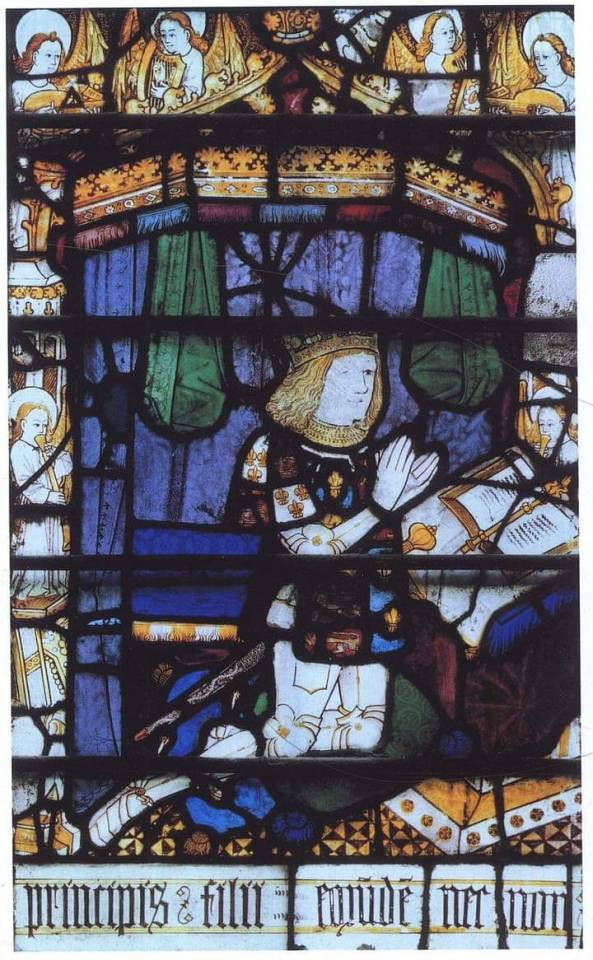

On the 2nd of April 1502, Prince Arthur Tudor of Wales and Lord of Snowdonia died in his principality at Ludlow Castle. He was only fifteen years old.
This left his young wife, Spanish Princess, Catherine of Aragon, in a political limbo. Questions arose regarding the Princess' possible pregnancy, and later on her alleged purity. The latter would come to haunt her again when Henry VIII made his intentions to annul their union so he could marry Anne Boleyn, clear.
His death also meant the death of his father's ambitions. He had named Arthur after the legendary king who united all of Britain against the Saxons and as such, Henry VII, believed that his eldest son would be the one to bring a second Camelot to England. The Arthurian myth was a Welsh myth that was appropriated by the English and one that Henry VII, being half Welsh, felt a close link to.
When Henry VII crossed the narrow sea and landed in Wales, people began to associate him with old Welsh prophecies, and he used Welsh motifs, claiming to be the true descendant of King Arthur, Cadwalader, etc. Henry VII wasn't the first successful usurper to do this. Henry IV and Henry VII's later-father-in-law, Edward IV had also used this tactic; but being half-Welsh, made more Welshmen directly associate him with these legendary and historical figures. As a result, Cadwalader's banner of the red dragon, became Henry's main flag and part of his royal coat of arms.
Seeking to bring legitimacy to his dynasty, he moved his pregnant wife to Winchester Cathedral, where many believed Camelot once stood. On the 20th of September 1485, Elizabeth delivered a healthy baby boy who was named Arthur and was christened days later.
Arthur received a strict religious and Humanist education and communicated with his future wife in Latin. The two, dressed in matching colors of white and gold, were married at St Paul's Cathedral in November 1501. The ceremony was followed by a sumptuous banquet and weeks of jousts and other lavish spectacle before it was decided the Prince and Princess of Wales should move to Ludlow Castle.
Just what killed Prince Arthur?
No one knows for sure. Historians speculate it was testicular cancer or the sweating sickness, while others take a middle approach (like John Guy) and state that he wasn't the sickly youth he's often depicted as in fiction but given the era he lived in, it is highly possible that he died of some common ailment.
Henry VII and Elizabeth of York, were told of their son's death two days later on April 4. The person chosen for this task was the King's confessor.
Henry was completely devastated. Equally heartbroken, Elizabeth of York “did her best to comfort him as they took ‘the painful sorrow together’” writes Licence. And that “God had left him yet a fair prince, two fair princesses” and that they were still young and could have more children. Afterwards, she went to her chambers to cry, and just as she had done, he comforted her.
Recently, many historians have taken an interest on the Tudor King that never was and have written extensively onhim. Besides the sources I cite below, other notable mentions are by Sean Cunningham whose biography on Arthur Tudor has received a lot of good reviews, Terry Breverton and Debra Bayani's respective biographies on Arthur's paternal uncle, Jasper Tudor, and Amy Licence's latest biography on Catherine of Aragon.
Some fans go even further and ask 'what if?' How different England would be today if Arthur had lived and more importantly, unlike his brother, remained married to Catherine of Aragon?
Since there is not a lot know about him in comparison to his father and brother, and not a lot has been written about him in the past (that didn't have to do with his union to Catherine of Aragon) he remains an interesting figure. And let's face it, we all love a good mystery. Unfortunately, this also makes him the subject of wild speculations and conjectures, most of which have no basis in fact.
Arthur Tudor was laid to rest at Worcester Cathedral on the 25th of April, 1502. His title of Prince of Wales was passed on to his younger brother, Henry, formerly the Duke of York.
Sources:
1. Sister Queens: the noble and tragic lives of Katherine of Aragon and Juana I of Castile by Julia Fox
2. Six Wives, Queens of Henry VIII by David Starkey
3. Henry VII by SB Chrimes
4. Tudor by Leanda de Lisle
5. The Six Wives and the Many Mistresses of Henry VIII by Amy Licence
6. Children of Henry VIII by John Guy
Images: Prince Arthur Tudor, anonymous painter, c.1501. Prince Arthur Tudor on stained glass window at Great Malvern and the tomb of Prince Arthur Tudor in Worcester Cathedral.
56 notes
·
View notes
Photo






Travis Louie’s “Curious Beasts” at KP Projects.
Currently on view Tuesdays through Saturdays, 12pm to 6pm at KP Projects in Los Angeles, California is artist Travis Louie’s solo exhibition, “Curious Beasts.”
Driven by a fascination and respect for animals and people from all walks of life, Louie finds inspiration in the imagination and the artistic process of externalizing characters into manifeted storytelling in painted form. Gothic writer Edgar Allen Poe described it as a way to destabilize the boundary between the internal working of the mind and reality. Contemporary British writer Terry Breverton’s describes it as ‘the art of creating supernatural illusions, the gathering of phantoms and fantasies.”
Strange creatures and mythical beasts appear in Louie’s paintings as dignified beings. Fancy Ogres transform from the dark roots of folklore and mythology into a dignified monsters dressed in lace cravats and top coats. As with past series of work, Louie plays with emotive expressions to make animals and creatures share greater attributes with their human counterparts. Tai Catfish masters the art of tranquility in his meditative stare and balanced gesture of mind body and soul; a dapperly dressed elephant gently walks his pet mouse amidst a delicate rose garden, and The ‘The Last Dust Bunny” becomes the personification of the stuff of magic and dreams. Although Louie’s aesthetic may affectionately borrow from the past, much of the inspiration for his thematic content is rooted within the present.
-
Be sure to follow Supersonic Art on Instagram!
128 notes
·
View notes